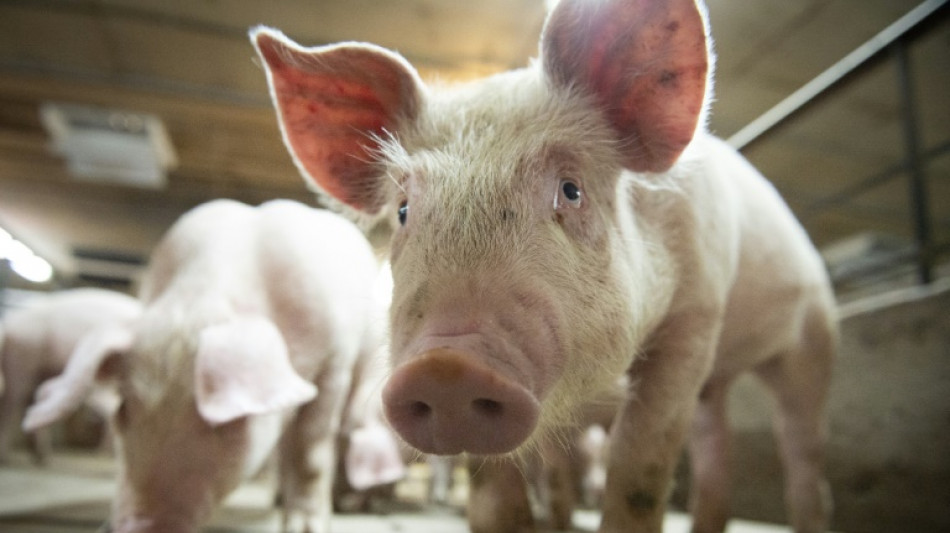
-
 Sarr strikes as Palace end winless run at Brighton
Sarr strikes as Palace end winless run at Brighton
-
Olympic star Ledecka says athletes ignored in debate over future of snowboard event

-
 Auger-Aliassime retains Montpellier Open crown
Auger-Aliassime retains Montpellier Open crown
-
Lindsey Vonn, skiing's iron lady whose Olympic dream ended in tears

-
 Conservative Thai PM claims election victory
Conservative Thai PM claims election victory
-
Kamindu fireworks rescue Sri Lanka to 163-6 against Ireland

-
 UK PM's top aide quits in scandal over Mandelson links to Epstein
UK PM's top aide quits in scandal over Mandelson links to Epstein
-
Reed continues Gulf romp with victory in Qatar

-
 Conservative Thai PM heading for election victory: projections
Conservative Thai PM heading for election victory: projections
-
Heartache for Olympic downhill champion Johnson after Vonn's crash

-
 Takaichi on course for landslide win in Japan election
Takaichi on course for landslide win in Japan election
-
Wales coach Tandy will avoid 'knee-jerk' reaction to crushing England loss

-
 Sanae Takaichi, Japan's triumphant first woman PM
Sanae Takaichi, Japan's triumphant first woman PM
-
England avoid seismic shock by beating Nepal in last-ball thriller

-
 Karl defends Olympic men's parallel giant slalom crown
Karl defends Olympic men's parallel giant slalom crown
-
Colour and caution as banned kite-flying festival returns to Pakistan

-
 England cling on to beat Nepal in last-ball thriller
England cling on to beat Nepal in last-ball thriller
-
UK foreign office to review pay-off to Epstein-linked US envoy

-
 England's Arundell eager to learn from Springbok star Kolbe
England's Arundell eager to learn from Springbok star Kolbe
-
Czech snowboard great Ledecka fails in bid for third straight Olympic gold

-
 Expectation, then stunned silence as Vonn crashes out of Olympics
Expectation, then stunned silence as Vonn crashes out of Olympics
-
Storm-battered Portugal votes in presidential election run-off

-
 Breezy Johnson wins Olympic downhill gold, Vonn crashes out
Breezy Johnson wins Olympic downhill gold, Vonn crashes out
-
Vonn's Olympic dream cut short by downhill crash

-
 French police arrest five over crypto-linked magistrate kidnapping
French police arrest five over crypto-linked magistrate kidnapping
-
Late Jacks flurry propels England to 184-7 against Nepal

-
 Vonn crashes out of Winter Olympics, ending medal dream
Vonn crashes out of Winter Olympics, ending medal dream
-
All-new Ioniq 3 coming in 2026

-
 New Twingo e-tech is at the starting line
New Twingo e-tech is at the starting line
-
New Ypsilon and Ypsilon hf

-
 The Cupra Raval will be launched in 2026
The Cupra Raval will be launched in 2026
-
New id.Polo comes electric

-
 Iran defies US threats to insist on right to enrich uranium
Iran defies US threats to insist on right to enrich uranium
-
Seifert powers New Zealand to their record T20 World Cup chase

-
 Naib's fifty lifts Afghanistan to 182-6 against New Zealand
Naib's fifty lifts Afghanistan to 182-6 against New Zealand
-
Paul Thomas Anderson wins top director prize for 'One Battle After Another'

-
 De Beers sale drags in diamond doldrums
De Beers sale drags in diamond doldrums
-
NFL embraces fashion as league seeks new audiences

-
 What's at stake for Indian agriculture in Trump's trade deal?
What's at stake for Indian agriculture in Trump's trade deal?
-
Real Madrid can wait - Siraj's dream night after late T20 call-up

-
 Castle's monster night fuels Spurs, Rockets rally to beat Thunder
Castle's monster night fuels Spurs, Rockets rally to beat Thunder
-
Japan votes in snow-hit snap polls as Takaichi eyes strong mandate

-
 Pakistan's capital picks concrete over trees, angering residents
Pakistan's capital picks concrete over trees, angering residents
-
Berlin's crumbling 'Russian houses' trapped in bureaucratic limbo

-
 Neglected killer: kala-azar disease surges in Kenya
Neglected killer: kala-azar disease surges in Kenya
-
Super Bowl set for Patriots-Seahawks showdown as politics swirl

-
 Sengun shines as Rockets rally to beat NBA champion Thunder
Sengun shines as Rockets rally to beat NBA champion Thunder
-
Matsuyama grabs PGA Phoenix Open lead with Hisatsune one back

-
 How Dental Implants Can Improve Your Quality of Life in Bonita Springs
How Dental Implants Can Improve Your Quality of Life in Bonita Springs
-
Washington Post CEO out after sweeping job cuts


Scientists revive cells and organs in dead pigs
Scientists announced Wednesday they have restored blood flow and cell function throughout the bodies of pigs that were dead for an hour, in a breakthrough experts say could mean we need to update the definition of death itself.
The discovery raised hopes for a range of future medical uses in humans, the most immediate being that it could help organs last longer, potentially saving the lives of thousands of people worldwide in need of transplants.
However it could also spur debate about the ethics of such procedures -- particularly after some of the ostensibly dead pigs startled the scientists by making sudden head movements during the experiment.
The US-based team stunned the scientific community in 2019 by managing to restore cell function in the brains of pigs hours after they had been decapitated.
For the latest research, published in the journal Nature, the team sought to expand this technique to the entire body.
They induced a heart attack in the anaesthetised pigs, which stopped blood flowing through the bodies.
This deprives the body's cells of oxygen -- and without oxygen, cells in mammals die.
The pigs then sat dead for an hour.
- 'Demise of cells can be halted' -
The scientists then pumped the bodies with a liquid containing the pigs' own blood, as well as a synthetic form of haemoglobin -- the protein that carries oxygen in red blood cells -- and drugs that protect cells and prevent blood clots.
Blood started circulating again and many cells began functioning including in vital organs such as the heart, liver and kidney, for the next six hours of the experiment.
"These cells were functioning hours after they should not have been -- what this tells us is that the demise of cells can be halted," Nenad Sestan, the study's senior author and a researcher at Yale University, told journalists.
Co-lead author David Andrijevic, also from Yale, told AFP the team hopes the technique, called OrganEx, "can be used to salvage organs".
OrganEx could also make new forms of surgery possible as it creates "more medical wiggle room in cases with no circulation to fix things," said Anders Sandberg of Oxford University's Future of Humanity Institute.
The technique could potentially also be used to resuscitate people. However this could increase the risk of bringing back patients to a point where they are unable to live without life support -- trapped on what is called the "bridge to nowhere," Brendan Parent, a bioethicist at the NYU Grossman School of Medicine, said in a linked comment in Nature.
- Could death be treatable? -
Sam Parnia of the NYU Grossman School of Medicine said it was "a truly remarkable and incredibly significant study".
It showed that death was not black and white but rather a "biological process that remains treatable and reversible for hours after it has occurred", he said.
Benjamin Curtis, a philosopher focused on ethics at the UK's Nottingham Trent University, said the definition of death may need updating because it hinges on the concept of irreversibility.
"This research shows that many processes that we thought were irreversible are not in fact irreversible, and so on the current medical definition of death a person may not be truly dead until hours after their bodily functions have stopped," he told AFP.
"Indeed, there may be bodies lying in morgues right now that haven't yet 'died', if we take the current definition as valid."
During the experiment, pretty much all of the OrganEx pigs made powerful movements with their head and neck, said Stephen Latham, a Yale ethicist and study co-author.
"It was quite startling for the people in the room," he told journalists.
He emphasised that while it was not known what caused the movement, at no point was any electrical activity recorded in the pigs' brains, showing that they never regained consciousness after death.
While there was a "little burst" on the EEG machine measuring brain activity at the time of the movement, Latham said that was probably caused by the shifting of the head affecting the recording.
However Curtis said the movement was a "major concern" because recent neuroscience research has suggested that "conscious experience can continue even when electrical activity in the brain cannot be measured".
"So it is possible that this technique did in fact cause the subject pigs to suffer, and would cause human beings to suffer were it to be used on them," he added, calling for more research.
X.Karnes--AMWN


